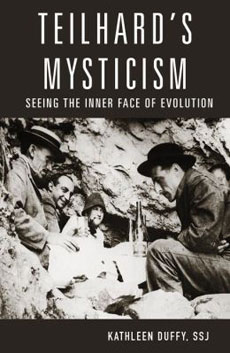"At its foundation Teilhard's is a mysticism of hope, a mysticism that sustained and empowered all that he did and freed him to be what he was called to be. Nature's response to the evolutionary impulse gave him confidence in God's action in the world. The story of the universal becoming encouraged him to trust and always led him to a larger world, to a more committed stance. He knew the importance of keeping 'the flame of desire ever alive in the world' (The Divine Milieu), of allowing his expectation of humanity's future to become incarnate. He sensed that the turmoil in the world was simply a sign that humanity is experiencing a major transition:
" 'Let us look at the earth around us. What is happening under our eyes within the mass of peoples? What is the cause of this disorder in society, this uneasy agitation, these swelling waves, these whirling and mingling currents and these turbulent and formidable new impulses? Mankind is visibly passing through a crisis of growth. Mankind is becoming dimly aware of its shortcoming and its capacities. . . . It sees the universe growing luminous like the horizon just before sunrise. It has a sense of premonition and of expectation.' (The Divine Milieu)
"Like the universe, Teilhard's mystical insights unfolded slowly and dramatically. As his scientific journey into the cosmos spiraled outward, his mystical journey to the heart of matter spiraled inward along those five circular paths that continued to nourish and sustain him throughout his life. Each branch of the spiral brought him into contact with new questions, questions that arose from life experience. He paid close attention to his questions; he cared about them. They stimulated both his mind and his heart; they kept him focused and alert. Each time his knowledge of the physical world expanded, he found it necessary to reshape his understanding of the transcendent and to adjust his spirituality to the shape of the universe that was being revealed to him. He discovered that 'truth . . . can be preserved only by being continually enlarged' (Writings in Time of War). By engaging questions that were so intimate and by remaining faithful to his inner voice, he unearthed hidden mystical treasures (Towards the Future) as well as insights that have universal appeal.
"In the end, nothing was lost. Everything of value found a place in his unique synthesis. Everything held together in the light of the Cosmic Christ. Each insight represented a spiritual advance that led finally to a tangible awareness of the Divine Grasp (The Heart of Matter). Teilhard's inner music sustained him, his love for Earth nurtured him, his interactions with others supported him, and his love for God compelled him to remain faithful. It was fidelity to his questions that made it possible for him, near the end of his life, to say to his fellow Jesuit and good friend Pierre Leroy, 'I really feel that now I'm always living in God's presence.' "
